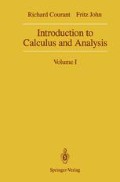Abstract
The fundamental limiting processes of calculus are integration and differentiation. Isolated instances of these processes of calculus were considered even in antiquity (culminating in the work of Archimedes), and with increasing frequency in the sixteenth and seventeenth centuries. However, the systematic development of calculus, started only in the seventeenth century, is usually credited to the two great pioneers of science, Newton and Leibnitz. The key to this systematic development is the insight that the two processes of differentiation and integration, which had been treated separately, are intimately related by being reciprocal to each other.1
Preview
Unable to display preview. Download preview PDF.
Author information
Authors and Affiliations
Rights and permissions
Copyright information
© 1989 Springer-Verlag New York, Inc.
About this chapter
Cite this chapter
Courant, R., John, F. (1989). The Fundamental Ideas of the Integral and Differential Calculus. In: Introduction to Calculus and Analysis. Springer, New York, NY. https://doi.org/10.1007/978-1-4613-8955-2_2
Download citation
DOI: https://doi.org/10.1007/978-1-4613-8955-2_2
Publisher Name: Springer, New York, NY
Print ISBN: 978-1-4613-8957-6
Online ISBN: 978-1-4613-8955-2
eBook Packages: Springer Book Archive

